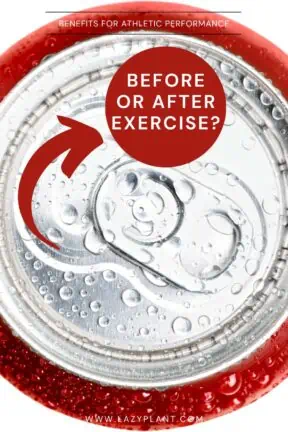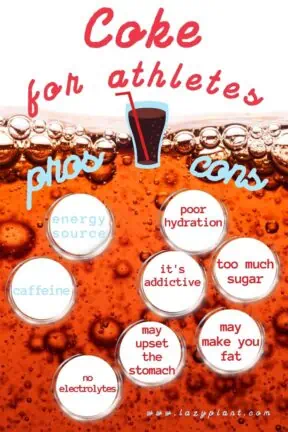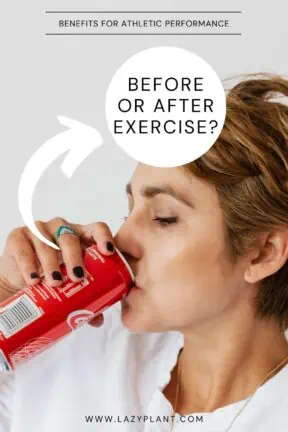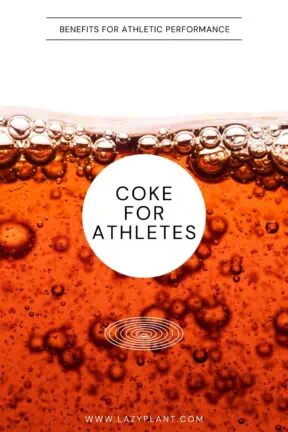Drinking Coca-Cola or any other sugar-rich beverage around exercise may have a few benefits for athletic performance, such as the extra boost of energy which is required in certain sports events. Also, the sugar in Coke may support muscle recovery.
Either way, most amateur athletes should drink sodas only sparingly.
Should I drink Coke before exercise?
Above all, drinking Coke before exercise may have beneficial effects on sports performance because it can boost the energy levels and alertness of an athlete, as it’s high in sugar and caffeine.
Caffeine in Coke boosts athletic performance
Firstly, drinking Coke before a workout may help certain athletes exercise harder because it contains some caffeine.
A 20 fl oz bottle of Coca-Cola contains about 57 mg of caffeine. This is about half the caffeine content of a cup of coffee. A can provides 34 mg of caffeine.[1]
Caffeine intake before exercise has great benefits for athletic performance. It can improve both aerobic and anaerobic performance, and even delay fatigue. It helps athletes of bodybuilding lift more weight, and endurance athletes run for longer.[2,3]
Also, caffeine may improve mood and alertness.

Additionally, caffeine may help the body burn belly fat, improving body composition. Therefore, high caffeine intake before exercise may help athletes build a lean body.[4,5]
Caffeine in a bottle of Coke is considered a pretty small dose, as compared to the amount found in energy drinks or pre-workouts. We have to drink many bottles of Coke to exceed the maximum safe dosage.
Drink Coke before a workout to skyrocket your energy intake
Another benefit of drinking Coke right before exercise is that it can skyrocket your energy levels. It’s packed with added sugar that the working muscles thrive at.
But, only athletes that work out hard and for a long time require high amounts of sugars, before or during exercise.
May contain phosphoric acid
Some sodas contain phosphoric acid. It’s a safe additive in small amounts that provides tartness.[6]
Phosphoric acid contains a small amount of the mineral phosphorus, which is a key mineral for energy metabolism. Phosphorus is a component of the body’s key energy source, ATP.[7]
The bones are the main stores of phosphorus. About 85% of phosphorus in the body is stored in the bones and teeth. The other 15% is distributed throughout the blood and soft tissues!
Phosphorus is an important component of muscle functions.
Low levels of phosphorus may cause muscle weakness, bone pain, or fatigue.
Hence, athletes, active people, and fitness enthusiasts should follow a diet high in phosphorus.
Benefits of drinking Coke during exercise!
Maybe, the best time of the day to drink Coke is during strenuous exercise. As Coke is high in sugar, it provides athletes with high amounts of energy when it’s needed the most.
The muscles require high amounts of pure sugar when executing demanding tasks.
However, only athletes who work out more than 60 minutes would benefit by drinking a sugar-rich beverage like Coca-Cola while exercising. Long-distance endurance athletes or athletes who perform high intensity internal training or explosive repetitive moves (e.g. athletes of CrossFit) are more likely to benefit from the high sugar content of Coke.
Coca-Cola or Gatorade during exercise?
Both Coke and Gatorade contain sugar. But, Coca-Cola also contains caffeine, while Gatorade contains electrolytes. So, what’s the best option for athletes?
Sugar
Firstly, both beverages are packed with sugar. Gatorade has 6 grams of sugar, while Coca-Cola has about 11.5 grams of sugar per 100 mL.[8]
A serving of Gatorade has 36 grams of sugar, while a bottle of Coca-Cola has 65 grams of sugar!
Coke has almost twice the amount of sugar than Gatorade.
Hence, an athlete should prefer drinking a beverage depending on his/her energy needs. Most amateur athletes, who don’t work out for hours, should prefer the beverage with the lowest amount of sugar, though.
Caffeine
Gatorade doesn’t contain any caffeine. So, Coke is a better option for those who want an extra boost of energy.
However, it’s preferable to consume beverages with caffeine 30–60 minutes before strenuous exercise. It takes time to act.
Electrolytes
Coke doesn’t contain any electrolytes, except a tiny dose of sodium.
On the other hand, a bottle of Gatorade provides 12% DV of sodium and 9% DV of potassium.
Either way, most athletes shouldn’t depend on Gatorade to replenish their lost potassium or sodium.

Athletes get more than enough sodium from a teaspoon of salt (also called sodium chloride)! In addition, following a diet high in potassium is far more beneficial for health and physical performance than consuming any soda.
But, Coke, Gatorade and other sports drinks may be beneficial for athletes who compete for extended periods of time. In this case, the constant refueling of the muscles with energy and replenishment of water and electrolytes is crucial for athletic performance.
Benefits of drinking Coke after strenuous exercise!
Coke or any other sugar-rich soda can be a great post-workout beverage because it can replenish muscle glycogen stores very fast after exhaustive workouts.
Both athletes of bodybuilding or endurance athletes who daily train hard should be very mindful of replenishing muscle glycogen stores as soon as possible. This is key for muscle growth, strength, stamina, and sports performance in general.
In this case, athletes should benefit by consuming high doses of sugar right after a workout. Drinking Coke right after strenuous exercise should actually be beneficial for muscle recovery!
In fact, the best time of the day to enjoy your favorite sugar-packed candy is right after exercise.
For instance, an athlete can enjoy healthy post-workout snacks with Nutella.
According to the post-exercise anabolic window theory, athletes should enjoy their favorite sugar-rich snacks and beverages for 2 hours after exercise.[9]
Why should an athlete avoid consuming Coke before/during/after a workout?
Certainly, Coke, as well as other sodas, are sugar-rich beverages with no vitamins or antioxidants. Most athletes shouldn’t consume them at all. It’s preferable to get your required energy from nutritious foods.
They may only be beneficial during a big race or other competitive athletic events.
Coke may upset the stomach during exercise
Firstly, athletes may avoid drinking Coke before or during a workout because its acidic and carbonation may upset people with a sensitive stomach.
However, most athletes tolerate carbonated beverages. Even during prolonged endurance exercise in the heat.[10]
If you have a history of stomach problems during exercise, but like refueling your body with Coke, you could open the bottle at the beginning of exercising. Most carbonation would have been removed when you start drinking your favorite soda beverage!
It spikes blood sugar levels
Coke is packed with sugar:
- a can has 39 grams of sugar
- a bottle (20 fl oz, or 591 mL) has 65 grams of sugar
This is way too much sugar. We shouldn’t consume more than 25 grams of added sugar on a 2,000-calorie diet.[11]
It means that just a bottle of Coke has 2.6 times more sugar than the maximum safe daily intake!
Hence, Coke and other sugar-packed beverages are beneficial only for elite athletes with huge energy needs who exercise for many hours.
As the main type of sugar in regular Coke is high fructose corn syrup, we should avoid consuming it before a workout. HFCS spikes blood sugar levels. This is bad for athletes who require steady levels of energy for hours.

So, prefer drinking small amounts of Coke during exercise for maintaining a steady energy intake.
Insulin spikes are only beneficial right after exercise for replenishing muscle glycogen stores! Insulin is a powerful anabolic hormone that helps store glycogen in the muscles.
But, you should avoid consuming sugar-rich foods at any other time of the day. Constant spikes of insulin can cause insulin resistance!
Phosphoric acid
Moreover, Coke has some phosphoric acid. A 12 oz can contains about 50-60 mg of phosphoric acid.[12]
Healthy people can easily absorb the added phosphorus in foods and beverages.
But, too much phosphorus may disrupt hormonal regulation and increase the risk of fracture. It negatively affects bone restoration, due to its high acidity and bioavailability.[13]
We shouldn’t exceed the maximum safe dosage.
Certainly, a serving of Coca-Cola is pretty safe. Only overconsumption of sodas may be dangerous for health.
Coke can make you gain weight
We gain weight when we consume more calories than we burn. It stands for athletes, too. It’s a common mistake to consume more calories after an exhaustive workout. People tend to reward themselves with big post-workout meals.
Coke can make you fat because it has too many calories. A bottle has 240 calories. You have to count these calories if you regularly drink it. Actually, most sodas and energy drinks are high in calories, as they’re packed with sugar.
Sugar is addictive
Keep in mind that sugar in sodas can be addictive. It affects the reward system of the brain. It makes us keep seeking more sugar. This can lead to overeating.
Athletes of bodybuilding in the cutting phase, or other athletes who want to maintain a certain body weight, should be very cautious with consumed sugar quantities.
Is diet soda better than regular soda for a lean body?
Zero-sugar Coke has no calories! It’s a preferable choice for people who want to lose weight. Even athletes who perform resistance training for a lean body in the cutting phase should prefer it over regular Coke.
Are artificial sweeteners safe?
Instead of sugar, diet soda contains artificial sweeteners. They’re considered safe, although further research is required.
However, although artificial sweeteners have no calories, they still can make you fat. They also interfere with the reward system of the brain. If you constantly consume sweet foods and beverages, you will always seek them.
Thus, it will be more difficult for you to consume healthy, plant-based foods. Vegetables and even fruits will become boring foods. Therefore, you should limit to the minimum any highly processed foods with a sweet taste.
How much Coke can an athlete drink a day?
Most amateur athletes shouldn’t drink regular Coke at all. It has too much sugar. It’s preferable to drink a can of diet Coke once in a while.
Athletes of bodybuilding
Athletes who follow resistance training burn only a few calories during a training session. So, they should avoid drinking too much regular Coke before or during a workout.
On the other hand, drinking a can of Coke right after strenuous exercise can spike insulin levels, helping replenish muscle glycogen stores! This is particularly beneficial for recovery and muscle gain!
Endurance athletes
On the contrary, endurance athletes burn substantially more calories per hour than athletes of bodybuilding. Still, a can of Coke should be the maximum intake for endurance athletes who regularly work out.
Only if an athlete runs for more than 90 minutes, he/she could drink a bottle of Coke per session.
Endurance athletes could drink Coke during or after a race!
How much Coke an athlete can drink per week?
It depends on the type, number, and intensity of workouts.:
- athletes who work out for a lean body could drink 1–2 servings of Coca-Cola per week.
- elite endurance athletes who run daily for 60–90 minutes could drink even 7 servings of Coke per week.
Other great beverages for athletes
Certainly, Coke, as the most sodas and energy drinks, isn’t the healthiest pre- and post-workout beverage option.
Above all, you should prefer drinking fruit juices. They’re also high in sugar. Most noteworthy, they’re packed with vitamins and antioxidants like vitamin C that help neutralize exercise-induced oxidative stress. Fruit juices promote muscle recovery!
For instance, tart cherry juice is one of the best beverages an athlete can drink before strenuous exercise.

Avoid drinking smoothies before a workout. Fiber may upset the stomach. You could drink protein-rich post-workout smoothies, though.
Also, you could drink coffee or tea before or after a workout. Both contain caffeine and powerful antioxidant compounds! You could add sugar for extra energy if you like.
How to drink Coke for better sports performance?
Bodybuilders as well as endurance athletes require much more than sugar during exercise. It’s beneficial to consume protein as well. So, you could eat a protein bar during strenuous exercise. Combining foods high in net carbs and protein can greatly extend time to exhaustion![14]